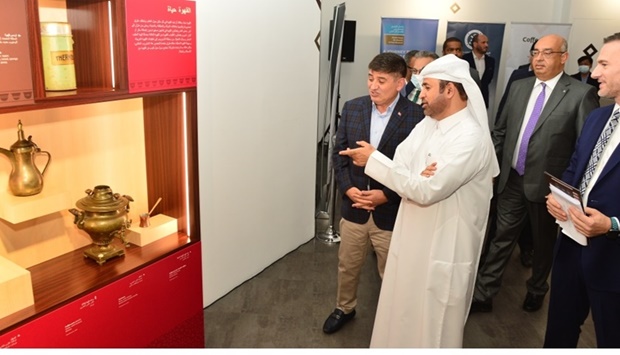A unique exhibition, titled ‘Coffee for Two – Cultures in Dialogue’, opened Sunday at Katara – the Cultural Village, featuring a selection of around 50 artefacts that put a spotlight on the beverage as a universal language and symbol of generosity.
Katara general manager Prof Khalid bin Ibrahim al-Sulaiti, Unesco Gulf States and Yemen Office director Salah Khaled, and Sheikh Faisal Bin Qassim Al Thani (FBQ) Museum director Claudio Cravero led the opening, which was attended by a number of ambassadors from various embassies in Doha.
“The exhibition is a multicultural project that wants to unite people in their diversity and shed light on what exactly unites us. Coffee for sure is the natural consequence or revolution of that exhibition because as we said before, coffee is a universal language, we sit down over a cup of coffee, we invite people over a cup of coffee,” Cravero said.
He said the show is the continuation of a long-term project that Sheikh Faisal bin Qassim al-Thani started in 2018 dubbed “The Majlis – Cultures in Dialogue”. It was launched in France and has toured various European capitals, including Paris, Vienna, and Valletta, among others.

The exhibition ended in Madrid during the Covid-19 pandemic, and it resumed at Alhambra in Granada, according to Cravero.
The collection on display, which includes photos, videos, and quiz games such as coffee pots, coffee thermos (1940), 20th-century glass mixer bottle, Arabic coffee fryer, and sieve, among others, “explore the cultural practices related to the home-roasted Arabic coffee (Qahwa) and the functions it performs for the communities.”

Cravero thanked Katara for hosting the exhibition (running until September 21 at Hall 47), saying there is no better place to open this show related to Qatari culture than in such a place (Katara), and Unesco for providing cultural support and patronage.
Speaking at the event, Dr Khaled said the “Arabic coffee, a symbol of generosity” was inscribed on the Unesco Representative List of Intangible Cultural Heritage of Humanity in 2015, based on the nomination submitted by United Arab Emirates, Saudi Arabia, Oman, and Qatar.


PICTURES: Shaji Kayamkulam
He noted that the element of Qawah was inscribed in 2015 together with the Majlis, while the third element that is of Qatar – falconry – was inscribed a year later.
“We have three elements here. In Unesco, we are working hand in hand with the different authorities, with different institutions to popularise this heritage, to make it known. Qawah in particular is an international language, it doesn’t stop here.
“You can see, this is a majlis, we are all gathered around Qahwa to discuss, to exchange for intercultural dialogue, inter-religious dialogue, for social cohesion and this is the most important of it. Being an element of the intangible cultural heritage of humanity not only here in Qatar or the region. It has become an intangible cultural element of the entire humanity.
“It is important to have these kinds of elements that facilitate or catalyse dialogue especially with the current challenges that the world is facing,” Dr Khaled said.
|
Evolution of coffee • The exhibition underlines the evolution of coffee over time and its modern adaptation. |
“The exhibition is a multicultural project that wants to unite people in their diversity and shed light on what exactly unites us. Coffee for sure is the natural consequence or revolution of that exhibition because as we said before, coffee is a universal language, we sit down over a cup of coffee, we invite people over a cup of coffee,” Cravero said.
He said the show is the continuation of a long-term project that Sheikh Faisal bin Qassim al-Thani started in 2018 dubbed “The Majlis – Cultures in Dialogue”. It was launched in France and has toured various European capitals, including Paris, Vienna, and Valletta, among others.
(From right) Claudio Cravero, Prof Khalid bin Ibrahim al-Sulaiti, and Dr Salah Khaled, along with ambassadors from different embassies in Doha at the event.
The exhibition ended in Madrid during the Covid-19 pandemic, and it resumed at Alhambra in Granada, according to Cravero.
The collection on display, which includes photos, videos, and quiz games such as coffee pots, coffee thermos (1940), 20th-century glass mixer bottle, Arabic coffee fryer, and sieve, among others, “explore the cultural practices related to the home-roasted Arabic coffee (Qahwa) and the functions it performs for the communities.”

A number of artefacts on display at the ‘Coffee for Two - Cultures in Dialogue’ exhibition.
Cravero thanked Katara for hosting the exhibition (running until September 21 at Hall 47), saying there is no better place to open this show related to Qatari culture than in such a place (Katara), and Unesco for providing cultural support and patronage.
Speaking at the event, Dr Khaled said the “Arabic coffee, a symbol of generosity” was inscribed on the Unesco Representative List of Intangible Cultural Heritage of Humanity in 2015, based on the nomination submitted by United Arab Emirates, Saudi Arabia, Oman, and Qatar.


PICTURES: Shaji Kayamkulam
He noted that the element of Qawah was inscribed in 2015 together with the Majlis, while the third element that is of Qatar – falconry – was inscribed a year later.
“We have three elements here. In Unesco, we are working hand in hand with the different authorities, with different institutions to popularise this heritage, to make it known. Qawah in particular is an international language, it doesn’t stop here.
“You can see, this is a majlis, we are all gathered around Qahwa to discuss, to exchange for intercultural dialogue, inter-religious dialogue, for social cohesion and this is the most important of it. Being an element of the intangible cultural heritage of humanity not only here in Qatar or the region. It has become an intangible cultural element of the entire humanity.
“It is important to have these kinds of elements that facilitate or catalyse dialogue especially with the current challenges that the world is facing,” Dr Khaled said.


